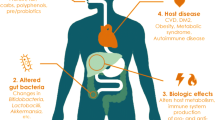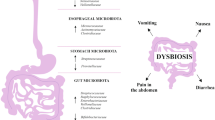Abstract
Background
Lactitol (4-β-d-galactopyranosyl-d-glucitol) is a sugar alcohol used as a sweetener. Previous studies have shown that it has a beneficial effect on intestinal microflora.
Aims of the study
To determine whether low doses of lactitol had beneficial effects without eliciting adverse gastrointestinal symptoms.
Methods
Faecal bacterial populations (total anaerobes, total aerobes, enterobacteria, bifidobacteria and lactobacilli), faecal pH and faecal short chain fatty acids (SCFA) were studied in a randomized longitudinal study of 75 non-adapted healthy adults before and after consumption of low doses of lactitol. Subjects consumed 25 g tablets of milk chocolate containing 10 g sweetener as sucrose:lactitol in ratios of 10:0, 5:5 or 0:10 daily for 7 d.
Results
No significant changes in faecal bacterial counts occurred in the 10:0 or 5:5 sucrose:lactitol groups. There were no significant changes in faecal anaerobes, aerobes, Enterobacteriaceae or lactobacilli during the study period in subjects consuming 0:10 sucrose:lactitol but there was a significant increase (P = 0.017) in bifidobacteria. There were no significant changes in faecal pH and SCFA for the 10:0 or 5:5 sucrose:lactitol groups but a significant decrease (P = 0.02) in faecal pH and significant increases (P = 0.001) in concentrations of propionic and butyric acids were observed in the 0:10 sucrose:lactitol group. There were few adverse symptoms of gastrointestinal intolerance to the daily consumption of 10 g lactitol.
Conclusions
The results show that low doses of lactitol can beneficially affect the faecal flora without eliciting gross symptoms of intolerance and that lactitol can be classified as a prebiotic.



Similar content being viewed by others
References
Abrahamse SL, Pool-Zobel BL, Rechkemmer G (1999) Potential of short chain fatty acids to modulate the induction of DNA damage and changes in the intracellular calcium concentration by oxidative stress in isolated rat colon cells. Carcinogenesis 20:629–634
Anon (1988) Association of the British pharmaceutical industry (ABPI). Patient information and consent for clinical trials. ABPI: London
Arunachalam KD (1999) Role of Bifidobacteria in nutrition, medicine and technology. Nutr Res 19:1559–1597
Ballongue J, Schumann C, Quignon P (1997) Effects of lactulose and lactitol on colonic microflora and enzymic activities. Scand J Gastroenterol 222:S41–S44
Beaugerie L, Flourié B, Pellier P, Achour L, Franchisseur C, Rambaud JC (1991) Tolérance clinique, absorption intestinale et valeur énergétique de quatre polyols pris à jeun (clinical tolerance, intestinal absorption, and energy value of four sugar alcohols). Gastroenterol Clin Biol 15:929–932
Cummings JH (1983) Fermentation in human large intestine; evidence and implications for health. Lancet 1:1206–1208
Cummings JH, Gibson GR, Macfarlane GT (1989) Quantitative estimates of fermentation in the hindgut of man. Acta Vet Scand 86:S76–S82
Cummings JH, Macfarlane GT (1991) The control and consequences of bacterial fermentation in the human colon. J Appl Bacteriol 70:443–459
Cummings JH, Macfarlane GT, Englyst HN (2001) Prebiotic digestion and fermentation. Am J Clin Nutr 72:S415–S420
Gibson GR, Fuller R (1998) The role of probiotics and prebiotics in the functional food concept. In: Sadler MJ, Saltmarsh M (eds) Functional foods: the consumer, the products and the evidence. The Royal Society of Chemistry, London, pp 3–14
Gibson GR, Roberfroid MB (1995) Dietary modulation of the human colonic microbiota: introducing the concepts of prebiotics. J Nutr 125:1401–1412
Goovaerts L, Ravelli GP (1993) Lactitol monohydrate for the treatment of chronic constipation-a multicentre study of the efficacy and tolerability of an individually adjusted daily dose. Acta Therapeut 19:61–71
Grimble GK, Patil DH, Silk DB (1988) Assimilation of lactitol, an ‘unabsorbed’ disaccharide in the normal human colon. Gut 29:1666–1671
Hartemink R, Domenech VR, Rombouts FM (1997) LAMVAB-A new selective medium for the isolation of lactobacilli from faeces. J Microbiol Meth 29:77–84
Hartemink R, Kok BJ, Weenk GH, Rombouts FM (1996) Raffinose-Bifidobacterium (RB) agar, a new selective medium for bifidobacteria. J Microbiol Meth 27:33–43
Kearsley MW, Dziedzic SZ, Birch GG, Smith PD (1980) The production and properties of glucose syrups 2. Sweetness of glucose syrups and related carbohydrates. Starke 32:244–247
Koutsou GA, Storey DM, Lee A, Zumbe A, Flourie B, LeBot Y, Olivier P (1996) Dose related gastrointestinal response to the ingestion of either isomalt, lactitol or maltitol in milk chocolate. Eur J Clin Nutr 50:17–21
Lanthier PL, Morgan MY (1985) Lactitol in the treatment of chronic hepatic encephalopathy; an open comparison with lactulose. Gut 26:415–420
Liu Q, Duan ZP, Ha DK, Benqmark S, Kurtivic J, Riordan SM (2004) Synbiotic modulation of gut flora: effect on minimal hepatic encephalopathy in patients with cirrhosis. Hepatology 39:1441–1449
Livesey G (2001) Tolerance of low-digestible carbohydrates: a general view. Br J Nutr 85:S7–S16
Macfarlane GT, Cummings JH (1991) The colonic flora, fermentation and large bowel digestive function. In: Philips SF, Pemberton JH, Shorter RG (eds) The large intestine: physiology, pathophysiology and disease. Raven Press Ltd, New York, pp 51–92
Macfarlane GT, Cummings JH (1999) Probiotics and prebiotics: can regulating the activities of intestinal bacteria benefit health? BMJ 318:999–1003
Macfarlane GT, Gibson GR (1995) Microbiological aspects of the production of short-chain fatty acids in the large bowel. In: Cummings JH, Rombeau JL, Sakata T (eds), Physiological and clinical aspects of short-chain fatty acids. Cambridge University Press, Cambridge pp 87–105
Mandal M, Olson DJ, Sharma T, Vadlamudi RK, Kumar R (2001) Butyric acid induces apoptosis by up-regulating Bax expression via stimulation of the c-jun N-terminal kinase/activation protein-1 pathway in human colon cancer cells. Gastroenterol 120:71–78
Marteau P, Flourie B (2001) Tolerance to low-digestible carbohydrates: symptomatology and methods. Br J Nutr 85:S17–S21
Marteau P, Pochart P, Flourie B, Pellier P, Santos L, Desjeux JF, Rambaud JC (1990) Effect of chronic ingestion of a fermented dairy product containing Lactobacillus acidophilus and Bifidobacterium bifidum on metabolic activities of the colonic flora of humans. Am J Clin Nutr 52:685–888
Minekus M, Smeets-Peeters M, Bernalier A, Marol-Bonnin S, Havenaar R, Marteau P, Alric M, Fonty G, Huis in’t Veld JHJ (1999) A computer controlled system to stimulate conditions of the large intestine with peristaltic mixing, water absorption and absorption of fermentation products. Appl Microbiol Biotechnol 53:108–114
Modler HW (1994) Bifidogenic factors- sources, metabolism and applications. Int Dairy J 4:383–407
Patil DH, Grimble GK, Silk DBA (1987) Lactitol, a new hydrogenated lactose derivative—intestinal absorption and laxative threshold in normal human subjects. Br J Nutr 57:195–199
Pryde SE, Duncan SH, Hold GH, Stewart CS, Flint HJ (2002) The microbiology of butyrate fermentation in the human colon. FEMS Microbiol Lett 217:133–139
Rambaud JC, Flourie B (1994) Mechanisms of carbohydrate induced diarrhoea. In: Binder HJ, Cummings JH, Soergel K (eds) Short chain fatty acids. Kluwer Academic Press, pp 232–239
Ravelli GP, Whyte A, Spencer R, Hotten P, Harbron C, Keenan R (1995) Effect of lactitol intake upon stool parameters and the faecal bacterial flora in chronically constipated women. Acta Ther 21:243–255
Roberfroid MB (2001) Prebiotics: preferential substrates for specific germs? Am J Clin Nutr 73:S406–S409
Sakata T (1987) Stimulatory effect of short-chain fatty acids on epithelial cell proliferation in the rat intestine: a possible explanation for trophic effects of fermentable fibre, gut microbes and luminal trophic factors. Br J Nutr 58:95–103
Scevola D, Bottari A, Franchini A, Guanziroli A, Faggi A, Monzillo V, Pervesi L, Oberto L (1993) The role of lactitol in the regulation of the intestinal microflora in liver disease. Giorn Ital Malatt Infett Parassit 45:906–918
Scheppach W, Bartram HP, Richter F (1995) Role of short-chain fatty acids in the prevention of colorectal cancer. Eur J Cancer 31A:1077–1080
Scheppach W, Luehrs H, Menzel T (2001) Beneficial health effects of low digestible carbohydrate consumption. Br J Nutr 85:S23–S30
Suau A, Bonnet R, Sutren M, Godon J-J, Gibson GR, Collins MD, Dore J (1999) Direct analysis of genes encoding 16S rRNA from complex communities reveals many novel molecular species within the human gut. Appl Environ Microbiol 65:4799–4807
Tarao K, Tamai S, Ito Y, Okawa S, Hayashi M (1995) Effects of lactitol on faecal bacterial flora in patients with liver cirrhosis and hepatic encephalopathy. Japan J Gastroenterol 92:1037–1050
Vanderdonckt J, Coulon J, Denys W, Ravelli GP (1990) Study of the laxative effect of lactitol (Importal®) in the elderly institutionalized, but not bedridden, population suffering from chronic constipation. J Clin Exp Gerontol 12:171–189
Wang X, Gibson GR (1993) Effects of the in vitro fermentation of oligofructose and insulin by bacteria growing in the human large intestine. J Appl Bacteriol 75:373–380
Wilson KH, Blitchington RB (1996) Human colonic biota studied by ribosomal DNA sequence analysis. Appl Environ Microbiol 62:2273–2278
Wollowski I, Rechkemmer G, Pool-Zobel BL (2001) Protective role of probiotics and prebiotics in colon cancer. Am J Clin Nutr 73:451–455
Yanahira S, Morita M, Aoe S, Suguri T, Nakajima I, Deya E (1995) Effects of lactitol-oligosaccharide on the intestinal microflora in rats. J Nutr Sci Vitaminol (Tokyo) 41:83–94
Acknowledgements
This study was supported by Purac Biochem, Holland.
Author information
Authors and Affiliations
Corresponding author
Rights and permissions
About this article
Cite this article
Finney, M., Smullen, J., Foster, H.A. et al. Effects of low doses of lactitol on faecal microflora, pH, short chain fatty acids and gastrointestinal symptomology. Eur J Nutr 46, 307–314 (2007). https://doi.org/10.1007/s00394-007-0666-7
Received:
Accepted:
Published:
Issue Date:
DOI: https://doi.org/10.1007/s00394-007-0666-7




